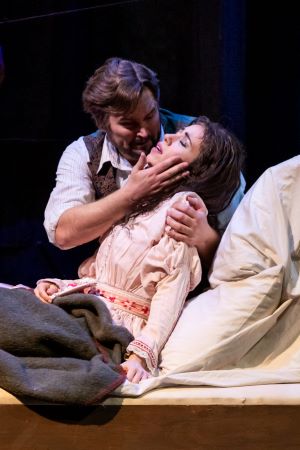Predictions of snow (the third weekend in a row) did not stop a large audience from attending the very successful presentation of the North Carolina Opera’s production of La bohème, Giacomo Puccini’s (1858-1924) most popular opera, in one of the largest opera houses in North Carolina, the Raleigh Memorial Auditorium (capacity 2600+), part of the Duke Energy Center for the Performing Arts.
The plot of the opera is simple, the singing spectacular and the acting outstanding – in short, this production was both moving and satisfying. The parallel between loss of love due to virus and the loss of a lover from consumption (tuberculosis) was a subtle undercurrent, but the bonds of humanity between artists have rarely been so well portrayed as in this opera, based on Henri Murger’s (1822-61) novel, Scenes of a Bohemian Life.
Four aspiring artists, a poet, a painter, a musician and a philosopher, share quarters and food. When they fall in love, they are all a happy gang of devoted friends. When the bonds of love are strained, the friends try to help – and when one lover, the exquisite Mimì, falls ill, the bonds of friendship tighten as each sacrifice something, in vain!
Mimì, beautifully sung by Canadian soprano, Lucia Cesaroni, is the charming and delicate tenant of the highest attic mansard, where she embroiders flowers and sells them at the market. Some of the most famous arias in all opera occur in the first act when Mimì introduces herself “Mi chiamano Mimì,” (“They call me Mimi… but my name is Lucy) upon which the poet, Rodolfo, sung by Scott Quinn, responds, “Chi son? Sono poeta…” (“Who am I, I am a poet… and how do I live… I just live!”). Cesaroni has a beautiful rich voice and a gorgeous soft top register; she is also a consummate actor… and quite the flirt! Quinn has a lovely timbre in the high register and made a strong match for his Mimì.
The opera opens with Rodolfo and Marcello (Levi Hernandez), his best friend, a painter and the abandoned lover of Musetta, complaining about the bitter cold and deciding to burn the poet’s latest work to keep warm. Colline, the philosopher (sung by Adam Lau, a bass-baritone with a gorgeous rich timbre and power) joins them and eventually Schaunard, (baritone Timothy Murray) the voice-teacher, comes in with bags of food and money in his pocket – he has finally been paid! A brief encounter with the landlord, M. Benoit, who has come to collect the over-due rent, introduces us to the comic actor par excellence, Donald Hartmann.
The second act, in the streets of the Latin Quarter of Paris on Christmas eve introduces us to another pair of lovers, the coquette, Musetta, sung and lived on stage by Shannon Kessler Dooley, who has a powerful voice and even more powerful stage presence as the insatiable and unstable siren of the Rive gauche. She is accompanied by the elder statesman Alcindoro (Donald Hartmann in his second role) who is sent away to fix her shoe the moment she spots her old flame, Marcello, at the next table.
The second act with crowd movements, children’s chorus, marching bands and table service remind us that the hard work of the director, Brenna Corner, is to make the staging seem natural. In fact, rarely have I seen such attention to detail, especially as echoed on the faces of the singers (Cesaroni in particular). The chorus and children’s chorus (a part of the Capital City Girls Choir and ringers from Meredith College) were both excellent and added much to the general hubbub of the holiday. (Kudos to chorus master Scott MacLeod and Lauren Saeger!)
Some of the most sublime music is sung in the outdoor third act, where for the first time in my memory, snow was not falling on stage! In some beautiful singing, Rodolfo and Mimì decide to stay together until spring, whereas Musetta and Marcello throw slanderous insults at each other, creating a tension that is not relieved until the closing scene of Act IV when Musetta’s compassion for Mimì provokes tears.
Even though the orchestration calls for another 10 instruments (mostly in the woodwinds and brass), the orchestra sounded rich and full under the direction of Maestro Joseph Mechavich, who sat in plain view of the audience, conducting without baton, yet evoking all the magic of a wand.
The opera will be repeated Sunday afternoon – see the sidebar for details.











